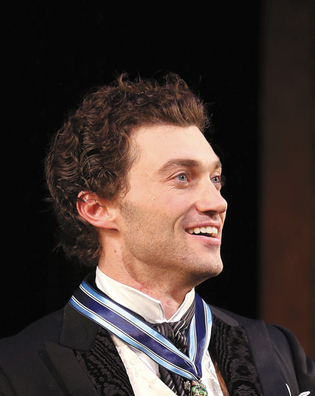 loading
loading
Where They Are NowA gentleman’s guide to successHow a Tony nominee decided he really was an actor. Theatre critic and reporter Mark Blankenship ’05MFA edits TDF Stages and produces the film series Meet the Theatre.
 Walter McBride/Getty ImagesIn the Tony Award-winning musical A Gentleman’s guide to Love and Murder, Bryce Pinkham ’08MFA—shown here in a curtain call on opening night—plays a man who is killing off his relatives one by one so he can inherit the family fortune. View full imageOnce he became a Tony nominee for the cheeky musical A Gentleman’s Guide to Love and Murder, Bryce Pinkham ’08MFA was firmly established as a Broadway leading man. (Along with his costar, Jefferson Mays ’87, he was nominated for Best Leading Actor in a Musical, though neither won. The show itself, whose lead producer was Joey Parnes ’77, won the Tony for Best Musical; Linda Cho ’98MFA won for Best Costume Design for a Musical.) When he’s not performing professionally, Pinkham coheads Zara Aina, a nonprofit collective that supports at-risk children in Madagascar through the creation of their own storytelling theater. He also performs regularly with the Brooklyn-based Outside the Wire, which tours classic plays to incite town-hall discussion of health and justice issues. Y: You didn’t always want to be a professional actor, right? P: I always did it as a serious hobby, growing up. The summer musical is where all the girls were! Y: It’s a tale as old as time. P: That version of it sells short my acting bug—which I had fully caught—but I wasn’t willing to admit that’s what I wanted to do as a livelihood. I played a lot of sports. I did Boy Scouts. School was also very important. And I’m thankful for that now, having been able to cultivate a number of different skill sets. Y: So you weren’t the kid who was lying to his parents about being premed when you were secretly in the drama society. P: Right. I was very academically motivated in high school. I went to Boston College with a mind toward discovering what I was going to do with my life. And I was happy to know the theater program was going to provide plenty of opportunities for me to continue this serious hobby. Then, about halfway through college, I said to myself, “I think I can safely say I would regret it if I didn’t try this.” So that’s where the impetus to audition for Yale came from. Y: Has your work at YSD affected what you’re doing in Gentleman’s Guide? P: I have no doubt that my [YSD] clown training is the reason I got this part. Plus, we did so much voice training at school, and part of this job has been to craft a performance that’s sustainable that uses a singing voice, a speaking voice, and a dialect. Y: Gentleman’s Guide is certainly a complex, funny show, and you’ve got a lot to do as the guy who’s killing his relatives to inherit the family fortune. But you’ve also done over 200 performances. At this point in the run, are there still things to discover? P: Oh, definitely. We find new touches and nuances for different jokes every night. We have a whole spit gag now, where the matriarch and the patriarch are barking at each other from the ends of the table, and now they bark and spit. That’s something that’s grown out of them doing it and getting a laugh, and now it’s become this whole thing with us getting hit by these flying globs and wiping our faces with our napkins. But then, also, there are nights where it doesn’t get the same response, so we’ll back off. You’re always tinkering. Y: It might surprise the audience to know you’re listening to them for cues. P: More than any other show I’ve done, because my character is the direct link to the audience in this piece. Every time, I try to find what this particular audience is feeling. If they’re playing hard to get, then I’ll ease them into the sly comedy of the piece. If they’re ready to go, then we can start having fun right away. Y: When did service become part of your life? P: My relationship to service was given to me by my experience in the Boy Scouts, and, even though I’m not a Jesuit, there’s a strong Jesuit tradition of serving at Boston College. By that I mean giving back to the community or serving the greater good. Y: Is it hard to maintain that sensibility while you’re also doing eight shows a week? P: Everyone who’s on Broadway knows that it doesn’t last forever. So it’s really about being able to do as much as you can with the position you’re in while you have it. Y: With Outside the Wire, you performed for soldiers at Guantánamo, Kuwait, and Qatar. Did that feel like service, or did it feel political? P: All of my experiences performing for the military have felt—not apolitical, but like I’m there on a human agenda, not a political agenda. And I’d go do that any time. It has made me realize the power we do wield as artists. As important as we are to entertainment, to helping people laugh—and laughter is important—we also have the ability to help an audience break through on a topic. We can create the platform for a discussion. Y: And that connects acting with your desire to make a difference. P: Acting, necessarily, is an extremely selfish enterprise, because we’re selling ourselves. We’re the product. But now I’ve been given this other perspective and the tools to understand that art has the ability to effect social change. That discovery has allowed me to finally accept that being a professional actor is what I’m meant to be doing.
The comment period has expired.
|
|